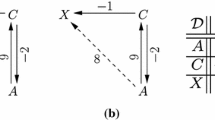Abstract
Earlier work on scheduling by autonomous systems has demonstrated that schedules in the form of simple temporal networks, with intervals of values for possible event-times, can be made “dispatchable”, i.e. executable incrementally in real time with guarantees against failure due to unfortunate event-time selections. In this work we show how the property of dispatchability can be extended to networks that include constraints for consumable resources. We first determine conditions for insuring that resource use does not exceed capacity under dispatchable execution for a single sequence of activities, or “bout”, involving one resource. Then we show how to handle interactions between resource and temporal constraints to insure dispatchability, how to enhance flexibility of resource use under these conditions, and how to handle multiple bouts interspersed with instances of resource release. Finally, we consider methods for establishing the necessary dispatchability conditions during schedule creation (planning stage). The results demonstrate that flexible handling of resource use can be safely extended to the execution layer to provide more effective deployment of consumable resources.
Similar content being viewed by others
Explore related subjects
Discover the latest articles, news and stories from top researchers in related subjects.References
Dechter, R., I. Meiri, and J. Pearl, “Temporal constraint networks,” Artificial Intelligence, 49, 61–95 (1991).
Jeavons, P., D. Cohen, and M. Gyssens, “A unifyingframework for tractable constraints,” in U. Montanari and F. Rossi (eds.), Principles and Practice of Constraint Programming-CP’95, vol. 976 of Lecture Notes in Computer Science, Springer, Berlin, 1995, pp. 276–291.
Muscettola, N., “HSTS: Integrating planning and scheduling,” in M. Zweben and M. S. Fox (eds.), Intelligent Scheduling, Morgan Kaufmann, San Mateo, CA, 1994, pp. 169–212.
Muscettola, N., P. Morris, and I. Tsamardinos, “Reformulating temporal plans for efficient execution,” in Proceedings, Sixth International Conference on Principles of KnowledgeRepresentation and Reasoning, KR-98, 1998.
Muscettola, N., P. Pandurang Nayak, B. Pell, and B. C. Williams, “Remote agent: To boldly go where no AI system has gone before,” Artificial Intelligence, 103, 5–47 (1998).
Wallace, R. J., “Planning for dispatchable execution with resource constraints: An update,” in IJCAI-01 Workshop on Planning with Resources, 2001, pp. 57–62.
Wallace, R. J. and E. C. Freuder, “Building dispatchable networks involving consumable resources within the HSTS framework,” in AAAI-00 Workshop on Constraints and AIPlanning, AAAI Press, Menlo Park, CA, 2000a, pp. 54–60.
Wallace, R. J. and E. C. Freuder, “Dispatchability conditions for schedules with consumable resources,” in Proceedings Fourteenth European Conference on Artificial Intelligence, ECAI-2000, IOS Press, Amsterdam, 2000b, pp. 536–539.
Wallace, R. J. and E. C. Freuder, “Dispatchable execution of schedules involving consumable resources,” in Proceedings, Fifth International Conference on Artificial Intelligence Planning and Scheduling (AIPS-2000), AAAI Press, Menlo Park, CA, 2000c, pp. 283–290.
Author information
Authors and Affiliations
Corresponding author
Rights and permissions
About this article
Cite this article
Wallace, R.J., Freuder, E.C. Supporting dispatchability in schedules with consumable resources. J Sched 8, 7–23 (2005). https://doi.org/10.1007/s10951-005-5313-7
Issue Date:
DOI: https://doi.org/10.1007/s10951-005-5313-7




